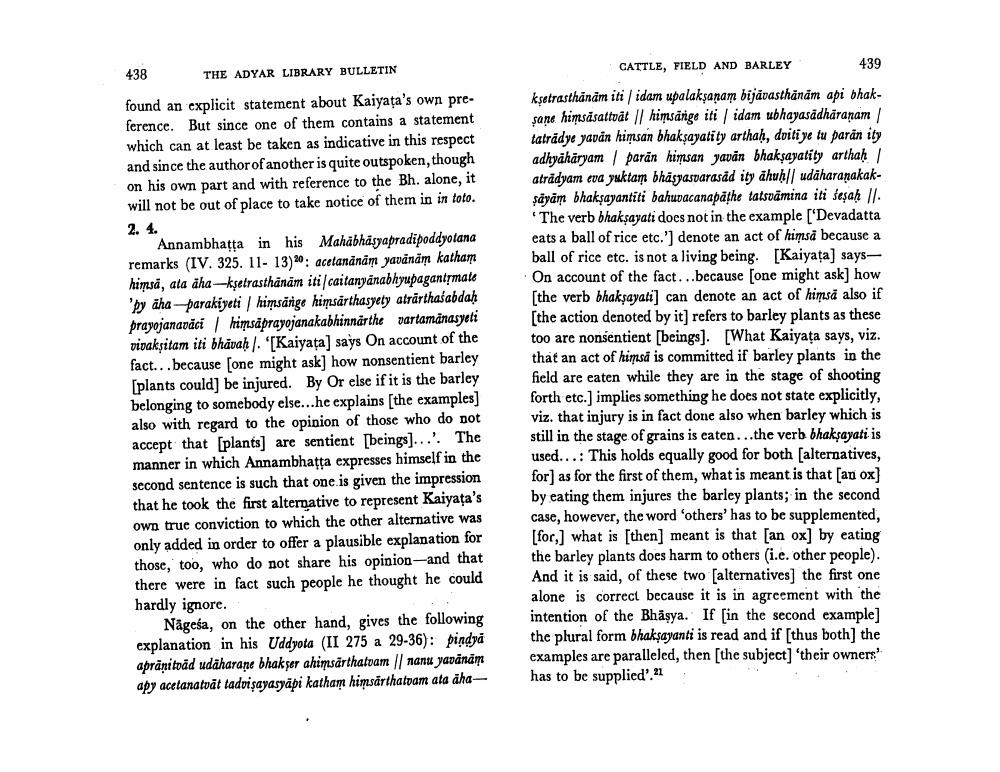Book Title: Cattle Field And Barley Note On Mahabhasya Author(s): A Wezler Publisher: A Wezler View full book textPage 5
________________ 438 THE ADYAR LIBRARY BULLETIN CATTLE, FIELD AND BARLEY 439 found an explicit statement about Kaiyata's own preference. But since one of them contains a statement which can at least be taken as indicative in this respect and since the author of another is quite outspoken, though on his own part and with reference to the Bh. alone, it will not be out of place to take notice of them in in toto. 2. 4. Annambhatta in his Mahabhäsyapradipoddyotana remarks (IV. 325. 11- 13): acetananam yavānäm katham himså, ata äha-ksetrasthanām iticaitanyänabhyupagantmate py ahaparakiyeti himsårige himsárthasyety atrárthaśabdah prayojanavaci himsāprayojanakabhinnärthe vartamanasyeti vivaksitam iti bhāvah l ' [Kaiyata] says On account of the fact... because [one might ask] how nonsentient barley [plants could be injured. By Or else if it is the barley belonging to somebody else...he explains (the examples] also with regard to the opinion of those who do not accept that (plants) are sentient [beings]...'. The manner in which Annambhatta expresses himself in the second sentence is such that one is given the impression that he took the first alternative to represent Kaiyata's own true conviction to which the other alternative was only added in order to offer a plausible explanation for those, too, who do not share his opinion-and that there were in fact such people he thought he could hardly ignore. Nagesa, on the other hand, gives the following explanation in his Uddyota (II 275 a 29-36): pindya aprānitväd udāharane bhakşer ahimsarthatam // nanu yavānam apy acetanatvát tadvisayasyäpi katham himsärthatvam ata äha ksetrasthanam iti idam upalaksanam bijāvasthänām api bhaksane himsåsattvåt himsänige iti / idam ubhayasadharanam taträdye yavån himsan bhakşayati ty arthah, dviti ye tu parån ity adhyähäryam parän himsan yavan bhakşayatity arthah atradyam eva yuktam bhāsyasvarasäd ity ahuh// udāharanakakşayām bhakşayantiti bahuvacanapăthe tatsvämina iti Sesah II. "The verb bhakşayati does not in the example ['Devadatta cats a ball of rice etc.') denote an act of himså because a ball of rice etc. is not a living being. [Kaiyata] saysOn account of the fact...because [one might ask] how [the verb bhakşayati) can denote an act of his also if [the action denoted by it) refers to barley plants as these too are nonsentient [beings). [What Kaiyata says, viz. that an act of himsa is committed if barley plants in the field are eaten while they are in the stage of shooting forth etc.) implies something he does not state explicitly, viz. that injury is in fact done also when barley which is still in the stage of grains is eaten...the verb bhakşayati is used...: This holds equally good for both [alternatives, for) as for the first of them, what is meant is that [an ox] by eating them injures the barley plants; in the second case, however, the word others' has to be supplemented, [for,] what is [then] meant is that [an ox] by eating the barley plants does harm to others (i.e. other people). And it is said, of these two [alternatives] the first one alone is correct because it is in agreement with the intention of the Bhäșya. If [in the second example) the plural form bhakşayanti is read and if [thus both) the examples are paralleled, then the subject] 'their owners' has to be supplied'.21Page Navigation
1 ... 3 4 5 6 7 8 9 10 11 12 13 14 15 16 17 18 19 20 21 22 23 24
